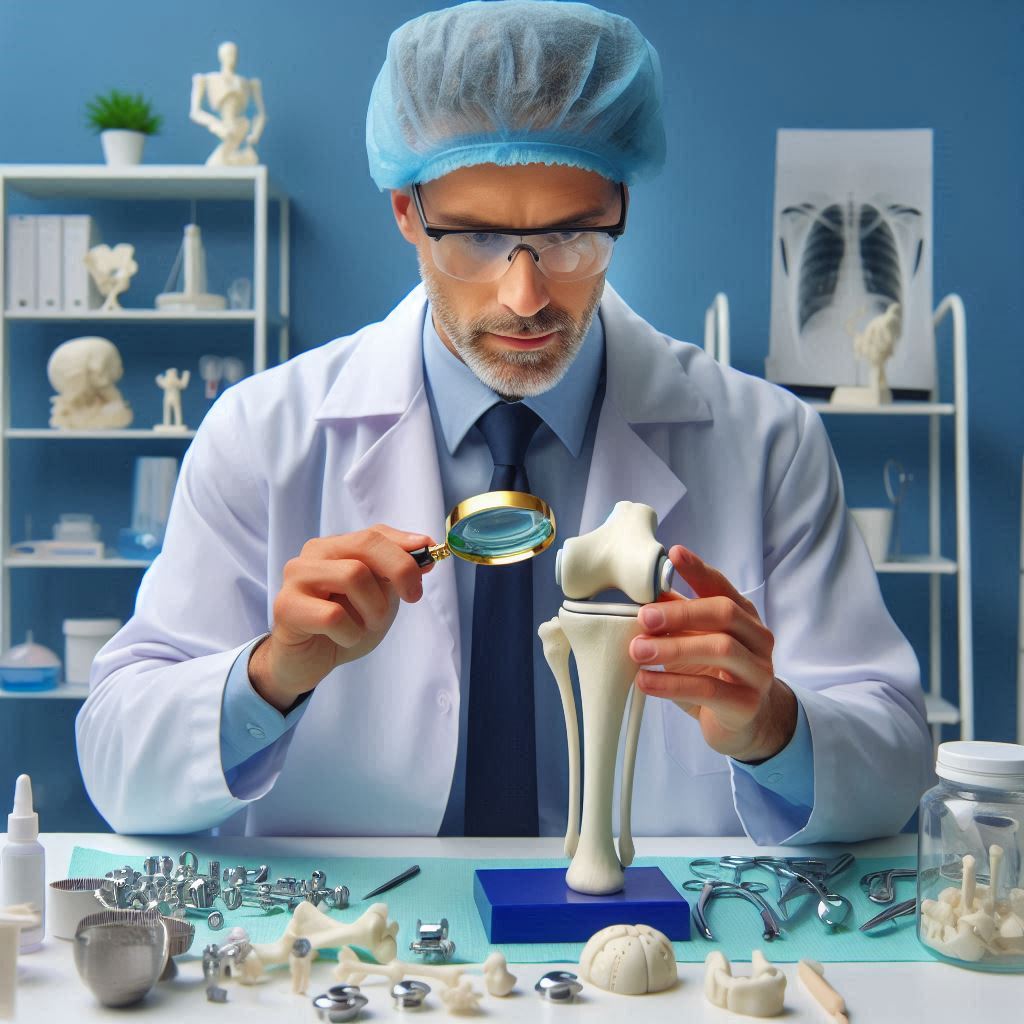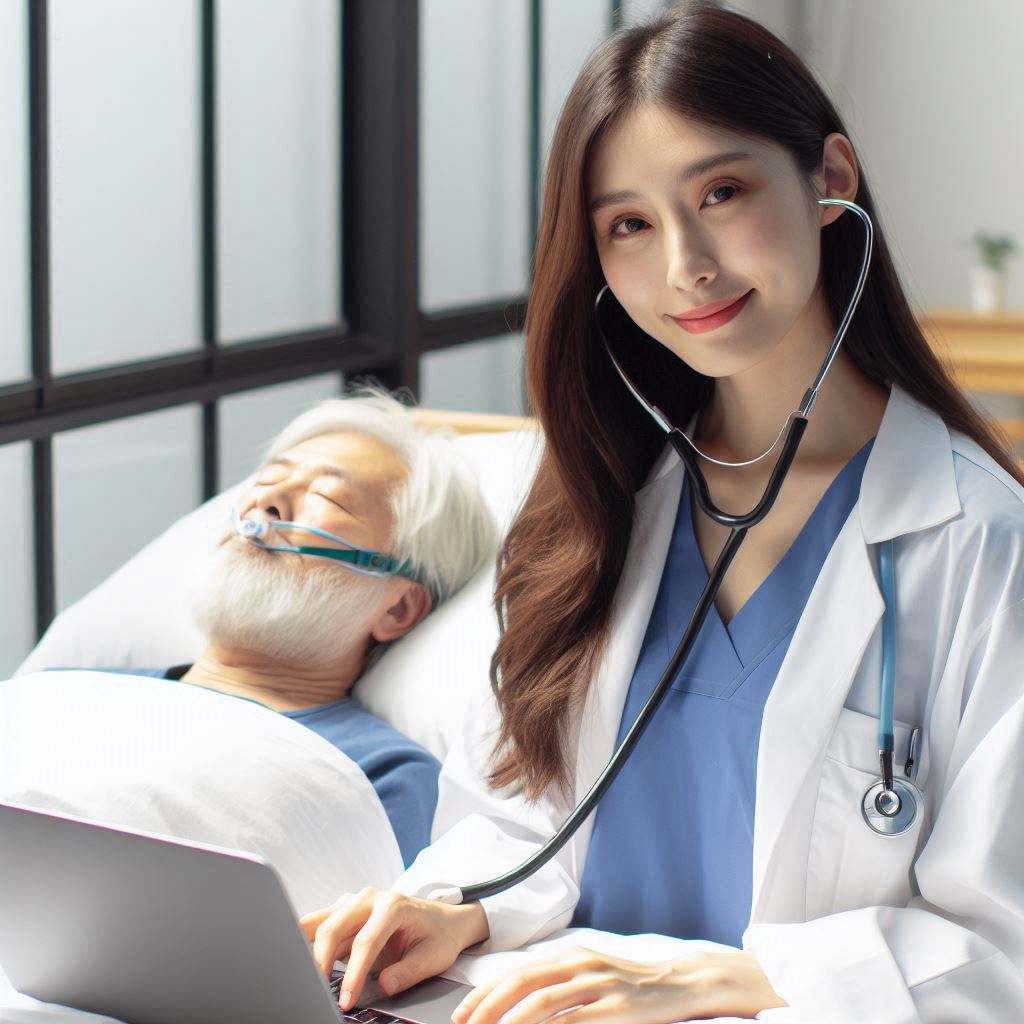Introduction
Sleep technologists play a pivotal role in healthcare by conducting comprehensive sleep studies to diagnose and treat a spectrum of sleep disorders.
Throughout these studies, we monitor patients overnight, meticulously analyzing their sleep patterns and physiological responses using advanced monitoring equipment.
In the realm of healthcare, the contributions of sleep technologists are indispensable.
Our detailed assessments offer critical insights into patients’ sleep health.
These insights help physicians create personalized treatment strategies.
These strategies not only improve sleep quality but also address underlying health conditions effectively.
Mastering the necessary skills for this role is paramount.
Proficiency in operating and calibrating sleep monitoring devices ensures accurate data collection, which forms the foundation for precise diagnosis and treatment planning.
Interpretation of complex sleep data demands keen analytical skills and a deep understanding of sleep physiology and pathology.
Moreover, effective communication skills are essential.
Sleep technologists must collaborate seamlessly with interdisciplinary healthcare teams, communicate findings clearly to physicians, and educate patients about sleep disorders and treatment options.
By continuously refining these skills, sleep technologists uphold high standards of patient care and contribute significantly to advancing the field of sleep medicine.
Education and Training
Required Education Level
Becoming a sleep technologist requires a solid educational foundation.
Most positions demand an associate’s or bachelor’s degree in polysomnography or a related field, such as respiratory therapy or neurodiagnostics.
These programs cover essential topics including sleep disorders, diagnostic techniques, and patient care protocols.
Courses in anatomy, physiology, and neurobiology form the core of the curriculum, providing a comprehensive understanding of the human body’s sleep mechanisms.
Additionally, students learn about the various stages of sleep, the impact of sleep disorders on health, and the methods used to diagnose and treat these conditions.
Practical training through internships or clinical rotations is also crucial.
It allows students to gain hands-on experience in sleep laboratories, honing their skills under the supervision of experienced professionals.
Laboratory courses teach the use of specialized equipment, such as polysomnography machines, which monitor brain waves, blood oxygen levels, heart rate, and breathing patterns during sleep studies.
This practical component ensures that students are well-prepared to enter the workforce and perform their duties effectively from day one.
Certification and Licensure Requirements
Certification is a critical step for aspiring sleep technologists.
The most widely recognized certification is the Registered Polysomnographic Technologist (RPSGT) credential, offered by the Board of Registered Polysomnographic Technologists (BRPT).
To earn this certification, candidates must pass a comprehensive exam that assesses their knowledge in areas such as sleep study procedures, data analysis, and patient care.
Preparing for the RPSGT exam requires dedication and a thorough understanding of polysomnographic principles.
The exam covers a broad range of topics, including the setup and calibration of equipment, patient preparation, data acquisition, scoring and interpretation of sleep studies, and patient follow-up.
Candidates typically need to complete an accredited educational program and gain clinical experience before sitting for the exam.
In addition to certification, some states require licensure to practice as a sleep technologist.
Licensure requirements vary by state but typically include passing a state-specific exam and meeting continuing education requirements.
Licensure ensures that technologists adhere to professional standards and maintain competency in their practice.
Continuing Education to Stay Current in the Field
Continuing education is vital for sleep technologists to stay current in the field.
Advances in sleep medicine and technology require ongoing learning and adaptation.
Attending workshops, conferences, and seminars helps professionals stay informed about the latest research, emerging trends, and best practices.
Many professional organizations offer continuing education opportunities, including the American Academy of Sleep Medicine (AASM) and the BRPT.
These programs cover a wide range of topics, from new diagnostic techniques to updates on sleep disorder treatments.
For instance, technologists may learn about the latest advancements in home sleep apnea testing, the development of new therapeutic devices, or novel approaches to managing insomnia.
Online courses and webinars provide convenient options for busy professionals.
They allow sleep technologists to earn continuing education credits while balancing work and personal commitments.
This flexibility ensures that technologists can continue to enhance their skills and knowledge without disrupting their careers.
Maintaining certification also involves completing continuing education requirements.
The BRPT requires RPSGTs to recertify every five years, which includes earning a specified number of continuing education credits.
This ensures that certified technologists remain knowledgeable and competent in their practice.
Recertification may also involve demonstrating proficiency in new technologies or methodologies that have become standard practice since their initial certification.
Knowledge of Sleep Disorders
Understanding of Different Sleep Disorders
A Sleep Technologist must have a deep understanding of various sleep disorders.
Sleep apnea, insomnia, and narcolepsy are common conditions they encounter.
Knowledge of these disorders allows technologists to perform accurate diagnostics.
Sleep apnea involves repeated breathing interruptions during sleep.
Insomnia is characterized by difficulty falling or staying asleep.
Narcolepsy causes excessive daytime sleepiness and sudden sleep attacks.
Recognizing these conditions and understanding their nuances is crucial for effective patient care.
Ability to Recognize Symptoms and Patterns in Sleep Studies
Recognizing symptoms and patterns in sleep studies is a critical skill for Sleep Technologists.
During a sleep study, technologists monitor and record patient data.
They observe sleep stages, breathing patterns, and other physiological indicators. Identifying abnormal patterns quickly is essential for accurate diagnosis.
For instance, technologists look for apneas or hypopneas in sleep apnea patients.
They note frequent awakenings or long sleep latency in insomnia sufferers.
Recognizing REM sleep abnormalities is crucial in diagnosing narcolepsy.
This ability to identify and interpret data patterns ensures that patients receive the correct diagnosis and treatment plan.
Knowledge of Treatment Options for Various Sleep Disorders
Sleep Technologists must also be knowledgeable about treatment options for different sleep disorders.
Treatment for sleep apnea often involves continuous positive airway pressure (CPAP) therapy.
Insomnia treatments include cognitive behavioral therapy and medication management.
Narcolepsy treatment may involve stimulant medications and lifestyle changes.
Technologists educate patients about these treatments and their benefits.
They also ensure that patients understand how to use and maintain CPAP equipment.
Providing this information empowers patients to manage their conditions effectively.
Continuous Learning and Adaptation
Staying updated on the latest advancements in sleep medicine is vital.
Sleep Technologists should engage in continuous learning and professional development.
Attending workshops and training programs helps them stay current with new treatments and technologies.
This ongoing education ensures they can provide the best care possible.
By staying informed, technologists can incorporate new knowledge into their practice.
This adaptability enhances their ability to diagnose and treat various sleep disorders effectively.
Essentially, a comprehensive knowledge of sleep disorders is essential for Sleep Technologists.
Understanding conditions like sleep apnea, insomnia, and narcolepsy is fundamental.
Recognizing symptoms and patterns in sleep studies ensures accurate diagnoses.
Knowledge of treatment options enables technologists to guide patients effectively.
Continuous learning and adaptation to new advancements are crucial.
These skills collectively enhance the quality of patient care and treatment outcomes.
By mastering these competencies, Sleep Technologists play a pivotal role in advancing sleep medicine and improving patients’ lives.
Their expertise in diagnosing and managing sleep disorders contributes significantly to the overall healthcare landscape.
Read: Surgical Technologist Job Outlook: Demand and Opportunities
Technical Skills
Sleep technologists play a crucial role in diagnosing and treating sleep disorders.
To excel in this field, they must possess a specific set of technical skills. Let’s delve into the technical skills required for sleep technologists.
Proficiency in Operating Sleep Study Equipment
Sleep technologists must be adept at operating sleep study equipment, including polysomnography machines and electroencephalogram monitors.
These devices are used to monitor a patient’s sleep patterns, brain activity, and other physiological functions during sleep studies.
An in-depth understanding of how to set up and calibrate these machines is essential to ensure accurate data collection.
Ability to Troubleshoot Technical Issues
During sleep studies, technologists may encounter technical issues with the equipment.
Being able to troubleshoot and resolve these issues promptly is a critical skill.
Whether it’s a glitch in the software or a malfunction in the hardware, technologists must be able to diagnose the problem and take the necessary steps to keep the study running smoothly.
Quick thinking and problem-solving skills are paramount in these situations.
Transform Your Career Today
Unlock a personalized career strategy that drives real results. Get tailored advice and a roadmap designed just for you.
Start NowKnowledge of Data Analysis Software
After collecting data from sleep studies, technologists need to analyze and interpret the results.
This requires proficiency in data analysis software specifically designed for sleep studies.
Technologists must be able to navigate through complex data sets, identify patterns, and draw meaningful conclusions from the information gathered.
A strong analytical mindset and attention to detail are essential for accurate data interpretation.
Generally, mastering these technical skills is fundamental for sleep technologists to provide high-quality care to patients with sleep disorders.
Continuous training and staying updated with the latest advancements in sleep study technology are key to excelling in this field.
By honing their technical skills, sleep technologists can make a significant impact on enhancing the quality of care for patients with sleep disorders.
Read: Interview Tips for Landing a Surgical Technologist Job
Communication Skills
Ability to Effectively Communicate with Patients Before, During, and After Sleep Studies
Effective communication with patients is a core skill for sleep technologists.
Before a sleep study, I explain the process clearly and answer any questions.
This reassures patients and alleviates their anxiety about the study.
During the sleep study, I provide ongoing updates and instructions, ensuring patients feel informed and comfortable.
After the study, I discuss the next steps with patients, addressing any concerns and explaining what they can expect.
This comprehensive communication builds trust and fosters a positive patient experience, essential for accurate sleep data collection.
Collaboration with Other Healthcare Professionals
Collaboration with other healthcare professionals is vital in my role.
I regularly interact with physicians, respiratory therapists, and other specialists to ensure cohesive patient care.
I share insights from sleep studies, contributing to a multidisciplinary approach to diagnosis and treatment.
For example, I communicate findings to physicians, providing them with detailed reports that aid in developing personalized treatment plans.
This teamwork enhances patient outcomes, ensuring that each professional’s expertise is utilized effectively.
Working with respiratory therapists, I coordinate care for patients with conditions like sleep apnea.
Our combined efforts ensure that patients receive comprehensive treatment, addressing both sleep and respiratory issues.
Clear and Concise Documentation of Patient Information and Sleep Study Results
Accurate documentation is another critical skill for sleep technologists.
I meticulously record patient information and sleep study results, ensuring clarity and precision.
This documentation includes patient histories, observations during the study, and detailed analysis of the data collected.
Clear and concise records are crucial for effective communication with other healthcare providers.
They rely on my documentation to make informed decisions about patient care.
Therefore, I ensure that every detail is accurately noted and easy to understand.
My documentation also includes visual aids like annotated graphs and tables, which help illustrate complex data clearly.
These tools enhance the clarity of the information presented, facilitating better understanding and decision-making.
Furthermore, I maintain confidentiality and adhere to ethical guidelines in all documentation.
Patient information is handled with the utmost care, ensuring privacy and compliance with legal standards.
In general, communication skills are essential for sleep technologists.
Effective patient communication before, during, and after sleep studies builds trust and ensures accurate data collection.
Collaboration with other healthcare professionals enhances patient care through a multidisciplinary approach.
Clear and concise documentation is critical for sharing information and supporting informed decision-making.
By honing these communication skills, sleep technologists can provide high-quality care and contribute significantly to the field of sleep medicine.
This commitment to effective communication ensures that we meet the needs of patients and healthcare teams with professionalism and precision.
Read: Continuing Education for Surgical Technologists: Why It Matters

Critical Thinking and Problem-Solving
Analytical Skills to Identify and Address Issues During Sleep Studies
Critical thinking and problem-solving are vital skills for Sleep Technologists.
Analytical skills enable them to identify and address issues during sleep studies effectively.
They must assess data trends and recognize anomalies quickly. This ability ensures the accuracy of diagnoses and enhances patient care.
Technologists should be able to troubleshoot equipment malfunctions swiftly to maintain study integrity.
They analyze complex data patterns to detect sleep disorders accurately.
This critical analysis helps in refining diagnostic approaches and treatment plans.
Ability to Make Quick Decisions in Emergency Situations
In emergencies, such as when a patient experiences a medical crisis during a sleep study, quick decision-making is crucial.
Sleep Technologists must remain calm and focused under pressure.
They need to prioritize patient safety and respond promptly to medical emergencies.
Rapid assessment and intervention can prevent serious complications and ensure patient well-being.
Training in basic life support and emergency procedures is essential for all technologists.
Their ability to act decisively and confidently during emergencies can make a significant difference in patient outcomes.
Problem-Solving Skills to Optimize the Quality of Sleep Study Data
Problem-solving skills are essential for optimizing the quality of sleep study data.
Technologists must troubleshoot and resolve issues that could compromise data accuracy.
They use critical thinking to improve study protocols and enhance diagnostic reliability.
Effective problem-solving also involves calibrating and maintaining equipment to ensure optimal performance.
Technologists develop innovative solutions to overcome challenges in sleep study environments.
They continuously seek ways to enhance data collection methods and improve diagnostic outcomes.
Sleep Technologists must also stay updated with the latest advancements in sleep study technology.
They attend workshops, participate in training programs, and engage in continuous education.
This commitment to learning ensures they remain proficient in using new technologies and techniques.
By integrating new knowledge and skills, they enhance their problem-solving capabilities and improve patient care.
Showcase Your Business Today
Reach thousands of readers actively exploring professional services. Publish your business profile and grow your audience now.
Publish NowIn general, critical thinking and problem-solving are indispensable skills for Sleep Technologists.
Analytical skills help them identify and address issues during sleep studies effectively.
The ability to make quick decisions in emergencies ensures patient safety and well-being.
Problem-solving skills are crucial for optimizing the quality of sleep study data.
These competencies enhance the accuracy of diagnoses and improve treatment outcomes.
By continuously developing these skills, Sleep Technologists contribute to advancing the field of sleep medicine and providing exceptional patient care.
Their expertise in critical thinking and problem-solving ultimately leads to better health outcomes and a higher standard of care in sleep medicine.
Read: Advancement Opportunities for Surgical Technologists
Patient Care and Empathy
Compassion and Sensitivity When Working with Patients Who May Be Experiencing Sleep Difficulties
As sleep technologists, we must prioritize patient care and empathy.
Compassion and sensitivity are crucial when working with patients experiencing sleep difficulties.
Many patients arrive anxious or uncomfortable, uncertain about what to expect. We alleviate their fears by explaining the process clearly and answering their questions patiently.
We exhibit empathy by acknowledging patients’ concerns and validating their feelings.
This approach fosters a supportive environment, making patients feel understood and cared for.
During sleep studies, we remain attentive and responsive to their needs, ensuring their comfort throughout the night.
Ability to Provide Emotional Support to Patients During Sleep Studies
Providing emotional support is an integral part of our role. We reassure patients who may feel vulnerable or self-conscious about their sleep issues.
By offering a listening ear and compassionate presence, we help them relax, which contributes to the accuracy of the sleep study.
Our role requires excellent communication skills. We explain complex medical information in simple terms, ensuring patients understand their condition and treatment options.
Clear communication fosters collaboration and empowers patients to take an active role in their healthcare journey.
We also collaborate with other healthcare professionals to provide comprehensive care.
By sharing insights and discussing treatment plans, we contribute to a holistic approach that addresses all aspects of a patient’s health.
This teamwork enhances patient outcomes and supports overall well-being.
Understanding of Patient Confidentiality and Ethical Guidelines in Healthcare
Understanding patient confidentiality and ethical guidelines is vital.
We adhere strictly to privacy laws and regulations, ensuring that patient information remains secure and confidential.
This commitment builds trust and promotes a safe environment for patients to share their concerns openly.
We also follow ethical guidelines in all interactions, treating each patient with respect and dignity.
We maintain professionalism, avoiding any actions that could compromise patient trust.
This ethical approach is fundamental to our work and reflects our dedication to patient well-being.
Compassion extends beyond the immediate interaction.
We follow up with patients, providing additional support and resources as needed.
This ongoing care demonstrates our commitment to their long-term health and reinforces the importance of maintaining good sleep habits.
Empathy and patient care are not just skills but essential components of our professional identity.
They define how we approach our work and interact with patients, ensuring that we provide the highest standard of care.
Ultimately, as sleep technologists, our ability to show compassion and sensitivity profoundly impacts patient experiences.
By offering emotional support, maintaining confidentiality, and adhering to ethical guidelines, we create a positive, trusting environment.
This approach not only enhances the accuracy of sleep studies but also promotes better health outcomes for our patients.
Our commitment to patient care and empathy underscores the importance of these skills in the field of sleep technology, ensuring we meet the needs of those we serve with professionalism and kindness.
Gain More Insights: Clinical Social Workers in Mental Health Facilities
Professionalism and Adaptability
Adherence to Professional Standards and Code of Ethics in Healthcare
Sleep Technologists must adhere to professional standards and a strict code of ethics in healthcare.
This adherence ensures patient trust and the highest quality of care.
Maintaining professionalism includes respecting patient confidentiality and providing compassionate, non-judgmental care.
Upholding these standards fosters a positive patient experience and reinforces the technologist’s role as a trusted healthcare provider.
Flexibility to Work Irregular Hours, Including Overnight Shifts
Flexibility is crucial in this field, as Sleep Technologists often work irregular hours.
Overnight shifts are common, given the nature of sleep studies. This schedule requires a willingness to adapt to non-traditional work hours.
Effective time management and personal organization help technologists maintain a healthy work-life balance despite these challenges.
Embracing this aspect of the job demonstrates dedication and commitment to patient care.
Willingness to Continue Learning and Adapting to Advancements in Sleep Study Technology
A willingness to continue learning is essential for Sleep Technologists.
The field of sleep medicine is dynamic, with frequent advancements in technology and methodology.
Staying current with these developments requires ongoing education and professional development.
Engaging in continuous learning opportunities, such as attending workshops, obtaining certifications, and participating in professional organizations, is vital.
This proactive approach ensures that technologists remain proficient and can deliver the best possible care.
Adapting to advancements in sleep study technology is a significant aspect of the profession.
Technologists must become proficient with new diagnostic tools and software.
This adaptability enhances their ability to conduct accurate and efficient sleep studies.
Staying updated with technological advancements also helps in troubleshooting and resolving technical issues swiftly, minimizing disruptions to patient care.
Professionalism and adaptability are intertwined with a Sleep Technologist’s success.
The ability to adhere to ethical standards, manage irregular hours, and embrace lifelong learning defines a competent technologist.
These attributes not only improve patient outcomes but also contribute to personal and professional growth.
In review, professionalism and adaptability are essential skills for Sleep Technologists.
Adhering to healthcare standards and ethics builds trust and ensures quality care.
Flexibility in working irregular hours, including overnight shifts, demonstrates dedication to the role.
A commitment to continuous learning and adapting to advancements in technology is crucial for staying current in this dynamic field.
By cultivating these skills, Sleep Technologists enhance their capabilities, contribute to better patient outcomes, and advance in their careers.
This combination of professionalism and adaptability ultimately strengthens the field of sleep medicine and improves the quality of care provided to patients.
Conclusion
Exploration of the essential skills for Sleep Technologists, it’s clear that proficiency in conducting sleep studies and analyzing data is foundational.
These professionals must also excel in patient monitoring, understanding various sleep disorders, and effectively operating diagnostic equipment.
The ability to interpret complex sleep patterns and communicate findings accurately is crucial in ensuring comprehensive patient care.
Emphasizing the importance of continuous training and ongoing education cannot be overstated.
Staying updated with advancements in sleep medicine and technology equips Sleep Technologists to provide cutting-edge care.
Professional growth in this field hinges on a proactive approach to learning and adapting to new methodologies and technologies.
For individuals aspiring to pursue a career as a Sleep Technologist, cultivating a passion for learning and a commitment to mastering technical skills is key.
Seek out opportunities for specialized training and hands-on experience to refine your expertise.
The field offers a rewarding path for those dedicated to enhancing patients’ quality of sleep and overall well-being.
By embracing these opportunities, you contribute to advancing the field of sleep medicine and making a positive impact in healthcare.
[E-Books for Sale]
The Big Book of 500 High-Paying Jobs in America: Unlock Your Earning Potential
$19.99 • 500 High-Paying Jobs • 330 pages
Explore 500 high-paying jobs in America and learn how to boost your career, earn more, and achieve success!
See All 500 High-Paying Jobs of this E-Book
1001 Professions Without a Degree: High-Paying American Jobs You Can Start Now
$19.99 • 1001 Professions Without a Degree • 174 pages
Discover 1001 high-paying jobs without a degree! Unlock career tips, skills, and success strategies for just $19.99!




